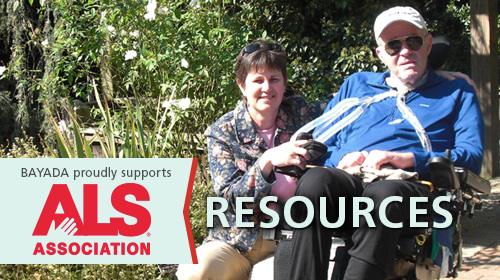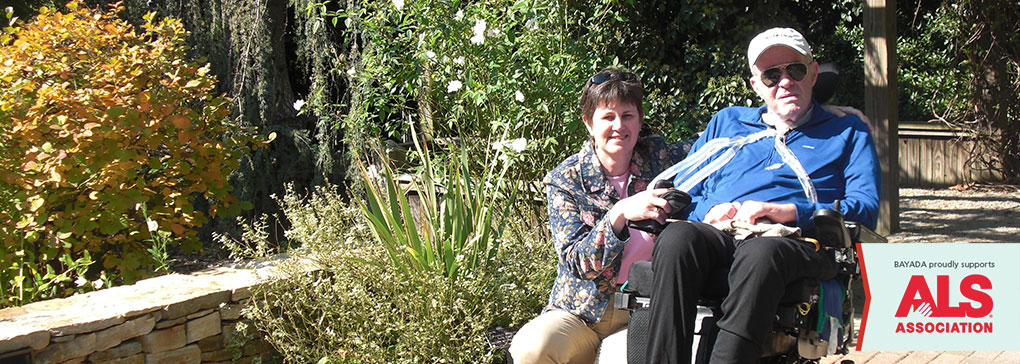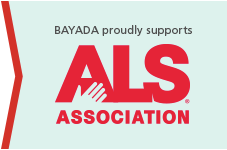

Resources about Home Health Care
Webinar
link opens in new windowThe Value of Home Health Care for Patients with ALS and Primary Caregivers
BAYADA presents an educational webinar about how professional home health care services can benefit people with ALS and their family caregivers. People with ALS are now able to receive some high tech care at home that was once only provided in hospitals such as tracheostomy and ventilator care. To learn more about home health care services, how to pay for services, how to choose the best home care agency for you, and the benefits of home care for both people with ALS and their loved ones, please view the recorded educational webinar above. link opens in new window. Download the supplemental resources guide to home health care for people with ALS here.
Information on How to Pay
Medicare
Medicare is a form of health insurance provided by the federal government for people over 65 or those under 65 with disabilities. For people with ALS, Medicare covers assessments for speech language pathology, and physical, occupational and respiratory therapies. It also covers durable medical equipment (DME), as recommended by a physical therapist. Medicare covers consultations with physical therapists to teach family caregivers and/or personal care assistants (home health aides or certified nursing assistants) how to help with range-of-motion exercises and how to use the DMEs. Hospice care is also covered under Medicare.
There is no 24-month waiting period for people with ALS to receive Medicare benefits. People with ALS, who are deemed to be homebound, will receive Medicare benefits as soon as they receive social security disability benefits. However, Medicare only covers intermittent, short-term care needs. People with ALS typically need long-term, skilled, and personal care that is not covered by Medicare.
Visit medicare.gov for more information.
Medicaid
Medicaid is another type of government insurance that covers medical costs for those with low incomes, as well as those with higher incomes whose medical costs are over a certain percentage of their income. Medicaid is a joint federal and state program. Eligibility requirements covered services vary from state to state.
The federal government does not require state Medicaid plans to cover home health care services. However, states may choose to offer home health care services as part of their state plans.
To increase the number of consumers receiving services at home instead of at more costly facilities, the federal government incentivizes states by offering waivers. Each state may choose to offer waivers for home health care services, which include (but are not limited to) skilled nursing, personal care, and therapeutic care. The main waivers are Home and Community Based Waiver 1915(b) and 1915 (c) and the Demonstration Waiver, 1115. Currently, 47 states and Washington D.C. are operating at least one waiver.
Visit medicaid.gov to understand eligibility in your state.
Managed Medicaid
Managed Medicaid is an arrangement between an individual state and managed care organizations. Each managed care organization receives a capitated rate from the state. Programs and services vary state to state. The plans operate similarly to a private health plan.
People with ALS will be assigned a case manager who can help navigate the benefits that may be covered, which vary by state.
Visit medicaid.gov to learn more about eligibility in your state.
Private Insurance
Private health insurance is provided through an employer or spouse’s employer from a private health insurance company or managed care organization. Private insurance plans may also be purchased individually. Home health care may or may not be covered by private insurance as this varies from policy to policy. If a person with ALS had private insurance prior to their diagnosis, they should check their policy for an ALS exclusion. If there is no ALS exclusion, check the policy to see if it covers private duty nursing and home health benefits. Most insurance companies that cover home health care benefits without a skilled need (personal care) are covered for short-term, intermittent periods.
For those who are denied coverage from private insurance, it is suggested that they file an appeal as long as the insurance plan covers private duty nursing or home health benefits.
Long-term Care Insurance
Long-term care insurance covers in-home services, such as skilled nursing, therapeutic care, and personal care. If ALS is covered under the long-term care insurance plan, home health care services will be covered. Most likely, if the person with ALS did not already have long-term care insurance, they will not be able to purchase it after their diagnosis.
Private Pay
If the financial resources are available, services may be paid for privately. All rates should be negotiated.
Many home health care companies, like BAYADA, work with people with ALS who are paying privately. It is important to negotiate rates and payment plans especially when paying privately for services. People with ALS should develop a long-term financial plan when considering home health care. We have seen some of our clients with ALS use the following options to help pay for services: savings, reverse mortgages, home equity lines, life insurance policy conversions, and home care loans.
Charitable Organizations
There are many organizations that can help pay for home health care for those with ALS. Local foundations and other associations may be set up to raise funds to pay for patient care. The ALS Association provides respite care programs and loan out a range of equipment, such as wheelchairs and communication devices.
Veterans Administration
ALS is considered a service-connected disease. The Veterans Administration (VA) will assume that any veteran diagnosed with ALS who served for a minimum of 90 continuous days on active duty was diagnosed because of, or aggravated by, their service in the military, regardless of when or where they served
Military veterans with ALS who were previously denied benefits should contact their local chapter of The ALS Association or other veterans’ service organizations to seek guidance about reopening their claim.
VA health benefits may include prescriptions, medical supplies, home improvement and structural alterations, as well as home health care coverage. To apply for benefits, people with ALS may contact their local chapter of The ALS Association or other veterans’ service organizations to seek guidance and assistance on the application process.
Additional Resources
- For a worksheet related to questions to ask a home health care provider, please click here to download a PDF.

- Find a BAYADA office located near you.
- Find an ALS Association chapter near you.



